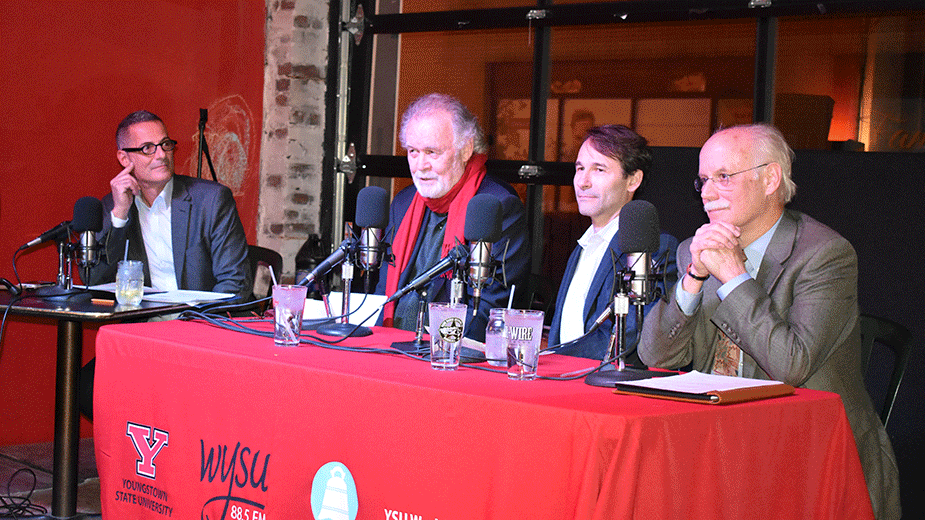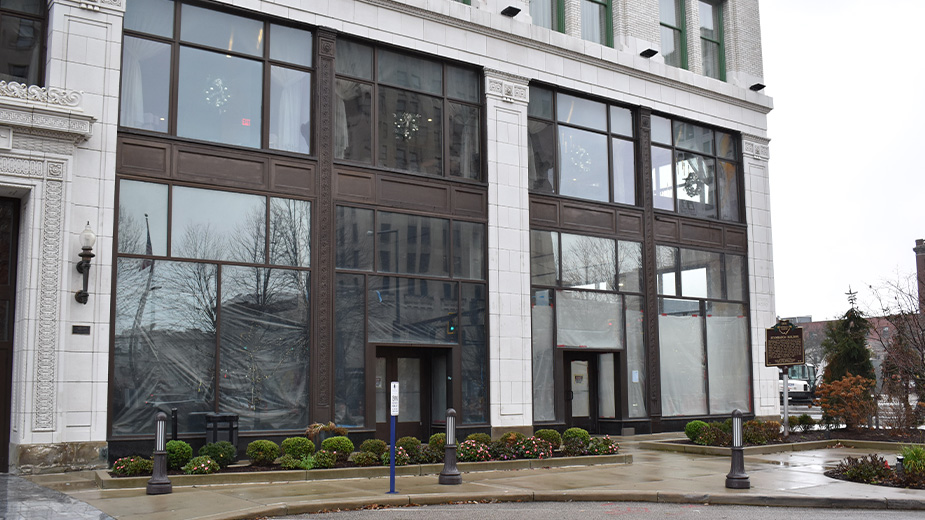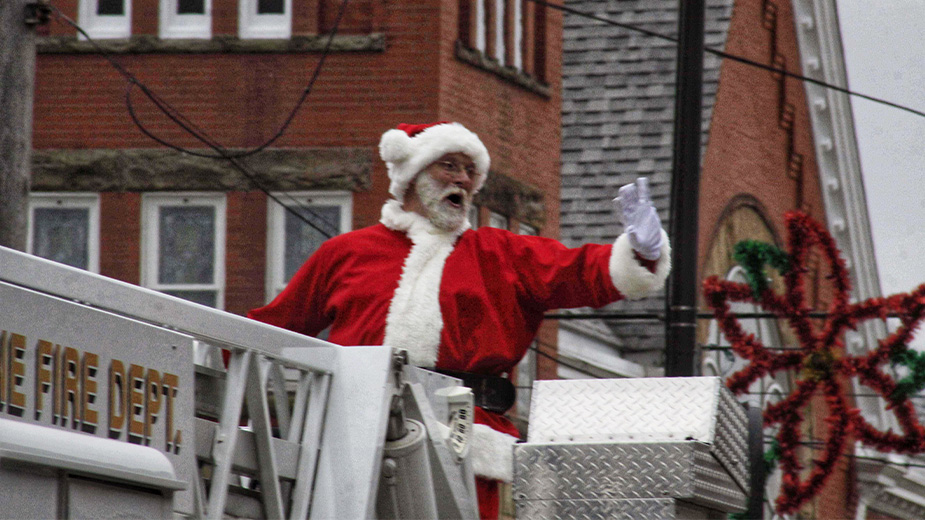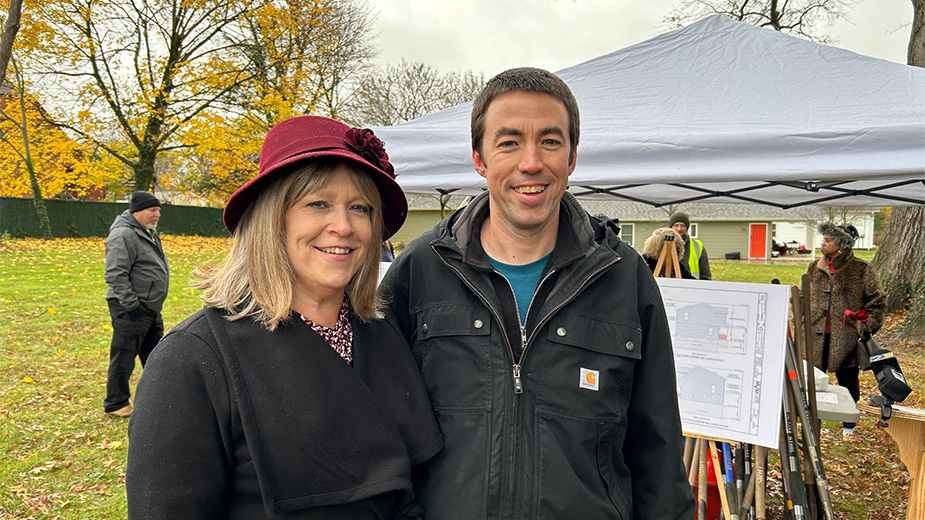City Club Panel Explores Divides After 2016 Election
YOUNGSTOWN, Ohio – Despite their differences, people from New York City and residents of the Mahoning Valley have one thing in common. Both populations are concerned about the apparent divide exposed by last year’s election of Donald Trump.
Monday night, Columbia University professors Raymond Horton and Bruce Usher participated in the City Club of the Mahoning Valley’s panel discussion, “Bridging the American Divide: Understanding Different Economic Realities – New York City vs. The Mahoning Valley.”
The panel discussion, moderated by Tim Francisco, English professor at Youngstown State University and director of YSU’s Center for Working Class Studies, featured Horton, Usher and Hunter Morrison, senior fellow in urban studies at Cleveland State University. The forum took place at Suzie’s Dogs & Drafts downtown.
Horton and Usher are in town with 20 of their students as part of a course they developed, “Bridging the American Divide,” following the 2016 presidential election. Like many Americans, they were surprised at the result and wanted to take a closer look at the populism that gave rise to Trump.
Horton said he is encouraged by the “universal concern about the extent to which society is divided,” something he has heard during his visit from not only liberals but people who supported Trump. “We’ve at least come to that kind of mutual understanding it’s time to think seriously about bridging the American divide,” he said.
“That’s a very good sign. Here’s the catch: No one had any really perfect ideas on how they do that,” Usher said. “On one hand, it was really good to hear that we’re all feeling the same thing. On the other hand, this is a big challenge.”
The rise of populism was the topic of a town hall meeting at Columbia featuring Horton and Columbia’s dean just before Election Day 2016. Both predicted that Hillary Clinton would be the next president of the United States, and the morning after the election realized they had “no idea what was going on,” Horton said.
Concerned that it was “a tragedy for America to be so divided,” Horton recalled, he and Usher put together their course to provide “a better understanding of what it was that was splitting America apart rather than binding it together.” The capstone event of the course is a trip to Youngstown, where the Columbia professors and students have spent the past several days.
While concerns over globalization and outsourcing have been identified as some of the factors that drove Trump’s support in areas like the Mahoning Valley, what has actually happened here is more nuanced, Morrison said. While the Valley does business in the global marketplace, it has experienced the effects of outsourcing, automation and de-laboring but not reaped benefits commensurate with what has been lost.
“What we see is stagnation and frustration written broadly across an area that was extraordinarily prosperous,” he said. This part of the country hasn’t been able to compete with the East and West coasts in terms of replacing what has been lost, he said. People also have heard promises from many politicians over the years and have long memories, he added.
“In city after city, the economic base has been boxed up and shipped way,” Morrison said “To understand the depth of that pain, you need to understand what it means to lose that work and what it means to lose that capacity and what it means to lose that facility, and to see your economy destroyed.
“It’s like the South after the Civil War. It’s like Europe after the second World War. It’s that level of impact,” he continued.
“The coasts have benefited from globalization, specifically New York City,” Usher affirmed. The real trade deficit is in goods, and New York isn’t a “goods-producing area of the country.” The service sector of trade there is in surplus, and fields such as finance, media and technology have benefited from globalization,
The city also has benefited from the concentration of the owners of capital there, he said.
Horton agreed. The median income of a family in New York City is about triple that of a family in Youngstown, he noted.
The real issue facing workers and the economy — for the country and to an extent globally — is automation, Usher said. Over the past 15 years, 88% of manufacturing job losses were due to automation, compared with just 12% due to globalization. Further, the trend is infiltrating other industries that so far largely have been spared losses from automation.
Moving forward, automation will be closer to artificial intelligence, Horton warned. AI already is taking over some traditional finance duties usually handled by MBA students. “The next wave of automation may catch the winners of past waves of automation and globalization,” he said.
“This trend is accelerating. This trend is unstoppable,” Usher added. “I don’t think there’s an easy answer to it.”
The Columbia professors praised what they saw taking place at the Youngstown Business Incubator and its work in additive manufacturing.
“It’s interesting because additive manufacturing is a form of automation,” Usher said. “YBI is a great example of the direction Youngstown should be headed.”
Horton noted that there appears to be cultural backlash at play as well in the divide. Many areas of the country that supported Trump also are doing well economically.
“One of the things that we have learned is that in our thinking about the rise of populism and the election of Trump, we underplayed the importance of race,” he said. “We heard it time and time again: It is one of the big cultural issues in Youngstown.”
One “Achilles heel” locally is the educational system, about which Horton said he has heard nothing but bad things.
“The truth of the matter is the changing nature of labor markets demand really powerful education,” he said. “If what I hear is true, that’s the No. 1 issue to focus on from a public policy perspective.”
Primary and secondary education are highly regulated by the state, Morrison noted, and it is “not at all clear” that what is being taught in schools is connected with employers’ emerging demands, he said.
Usher said he is pleasantly surprised with the civility of the discussions that took place here. “I’m happy to say that this turned out to be a nonconfrontational process,” he remarked.
Once they return to Columbia, Horton, Usher and the students will share what they’ve learned with the larger student body, and determine whether they want to repeat the course and return to Youngstown.
“We’re also going to figure out how we can induce some people from Youngstown to come to New York City and spend some time with us for a long weekend,” Horton said.
“If we come back, next time I hope we have home stays,” he added. “I don’t want to stay in a hotel again. I’d rather each of us be with a family here in Youngstown.”
Pictured: Moderator and YSU professor Tim Francisco, Columbia University professors Ray Horton and Bruce Usher, and Cleveland State University senior urban studies fellow Hunter Morrison.
Copyright 2024 The Business Journal, Youngstown, Ohio.



